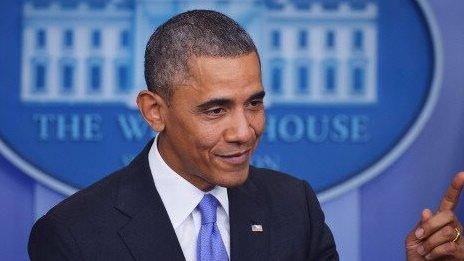A big year for Obama and the Democrats
- Published
- comments

Barack Obama has returned to Washington - and to a crucial year in his presidency
A belated Happy New Year to all my readers, and good luck to you all in avoiding being sucked into the polar vortex, as I look forward to 2014.
2013 was a bad year for Barack Obama. It was a bad year for Republicans too.
The 2014 midterm elections in November may not actually change the balance of power in the Senate and House, but they will be powerfully important for both parties as they wallow in a mire of their own making, under the disapproving gaze of a disappointed, disgruntled electorate.
They will be a forceful signal of where the US is heading - and vitally important for candidates thinking of standing for president in 2016.
This year it will be a race to avoid the bottom and a careful courting of a disapproving electorate.
President Barack Obama will do all he can to fire up potential supporters.
A year ago in his second inaugural address, he set out a range of issues, from gun control to environmental controls, but they were way beyond his legislative grasp. It must be why he intends, according to widespread reports, to concentrate on economic inequality in this month's State of the Union speech, external.
Two reactions
But that "keynote address to the nation" tends to be a one-day wonder.
Residents of Kentucky, one of the unhealthiest states in America, talk to the BBC about their hopes and concerns about Obamacare
What is more likely to determine the fate of Democrats, and how history sees this president, is how Obamacare turns out in practice.
The botched launch of the healthcare law's federal exchange website, where Americans are supposed to sign up for private insurance, damaged the president's approval rating in 2013 - both for competency and trustworthiness.
The plan to make all Americans take out health insurance is Mr Obama's main achievement in office, and it is the biggest change he has made to American society.
For better or worse it will be a substantial part of his legacy.
The website appears to be recovering, statistically if not anecdotally. But there are grave dangers ahead.
At the end of last year I saw the Obamacare sign-up in action in two very different states, Mississippi and Kentucky.
They are both in the South and both of a conservative disposition. But in Mississippi the Republican governor will have nothing to do with the plan, whereas the Democratic governor in Kentucky has embraced its possibilities.
I hope I will get the chance this year to look at other examples but these trips have left me with the strong feeling the healthcare changes will play very differently in different states - and within social classes.
'Death spiral'
Democrats argue that once the wrinkles are ironed out it will be popular, and people will be loathe to vote for a party that would take it away from them.
That may well be true in some places - those states which have chosen to embrace expanding Medicaid, a US healthcare programme for the poor, and run their own exchange websites.
The BBC's Mark Mardell assesses what the potential legacy of Obamacare
But in Republican states where they do neither (and so people have to rely on the glitchy federal website), it could end up being very expensive for individuals and firms, and have a very low take-up.
The less popular it is, the more problems are created, increasing its unpopularity, making the problems worse and so on.
If I am right, a scheme that philosophically and politically already drives a wedge between Americans will, as it comes into force, be seen very differently in different places and so end up further deepening the partisan geographical split.
The biggest danger for the plan as a whole is the "death spiral" - the sick and older signing up with not enough young fit people to balance them - potentially bankrupting the whole system.
March is the key date for that, when people are meant to have signed up or will have to face a fine.
Republicans are preparing a flood of new adverts on Obamacare, to help them in the midterm elections. Democrats are waiting nervously, hesitating between snubbing the president's plan and promoting its virtues. The next three months will be critical.
Later this week I will look at the Republicans' challenges this year, as well as what's next in the US and the world in 2014.
- Published29 March 2019

- Published16 December 2013

- Published6 November 2013
- Published19 December 2013